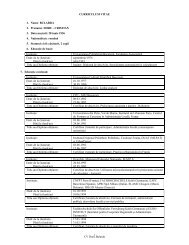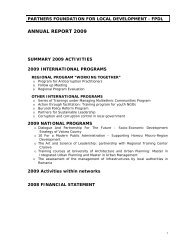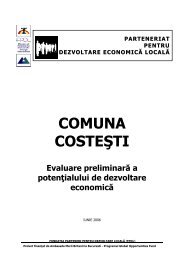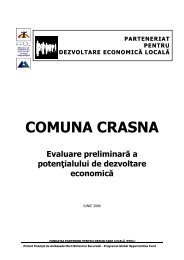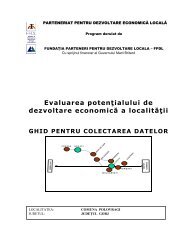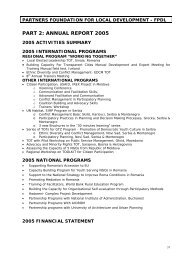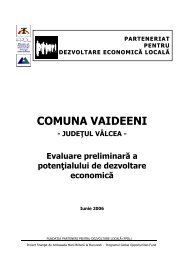Organizational Development: A Manual for Managers and ... - FPDL
Organizational Development: A Manual for Managers and ... - FPDL
Organizational Development: A Manual for Managers and ... - FPDL
Create successful ePaper yourself
Turn your PDF publications into a flip-book with our unique Google optimized e-Paper software.
Chapter 1.5 In<strong>for</strong>mational Processes<br />
It is the recipient who communicates.<br />
The so-called communicator, the person who emits the communication,<br />
does not communicate. He utters.<br />
Unless there is someone who hears, there is no communication. There is only noise.<br />
Peter Drucker (1974)<br />
What is “in<strong>for</strong>mation“?<br />
In this difficult case even Wikipedia does not help us very much. It says: ‘In<strong>for</strong>mation as a concept<br />
bears a diversity of meanings, from everyday usage to technical settings. Generally speaking, the<br />
concept of in<strong>for</strong>mation is closely related to notions of communication, constraint, control, data,<br />
<strong>for</strong>m, instruction, knowledge, meaning, mental stimulus, pattern, perception <strong>and</strong> representation.’<br />
(www.en.wikipedia.org). It means saying a lot to say nothing, doesn’t it?<br />
Alas, badly defined basic concepts <strong>and</strong> notions, also different in different languages <strong>and</strong> cultures,<br />
(un<strong>for</strong>tunately, using sometimes even the same spelling) often seem to be very familiar to<br />
everyone, thus creating an illusion that they are clearly understood. This creates a problem <strong>for</strong><br />
global communication. If the terms did not sound so familiar, if we did not hear these words a<br />
hundred times everyday, we would ask what they mean, discuss the answers <strong>and</strong> come to a more<br />
or less similar underst<strong>and</strong>ing, making our communication much more effective.<br />
Trainers’ <strong>and</strong> consultants’ communications must be effective. That is why they spend the<br />
necessary time to get consensus on the meaning of words that intend to play an important role in<br />
further explanations <strong>and</strong> discussions.<br />
In<strong>for</strong>mation is very important term <strong>for</strong> any management related subject. Because managers most<br />
of the time do nothing else, just communicating <strong>and</strong> processing in<strong>for</strong>mation. Effective <strong>and</strong> efficient<br />
processing of in<strong>for</strong>mation creates a significant precondition <strong>for</strong> the effective <strong>and</strong> efficient work of a<br />
manager. Like efficiency of processing fuel in engine conditions efficiency of using care.<br />
Few managers would be able to say what ‘in<strong>for</strong>mation’ means. Most often – they confuse it with<br />
‘data’. A certain contribution to the misunderst<strong>and</strong>ing was made by the common use of the term<br />
“IT” <strong>for</strong> purely data processing technologies. Thus, we shall discuss the issue in more detail. For<br />
this we shall start with the behaviour of organisms. In<strong>for</strong>mational processes in nature make no<br />
sense <strong>for</strong> non-living matter.<br />
52



